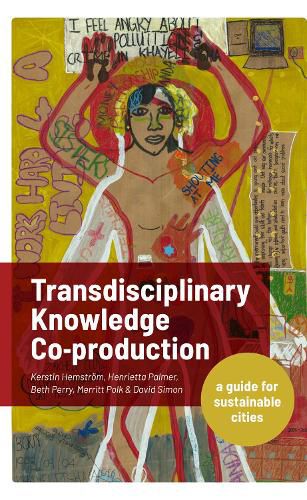Readings Newsletter
Become a Readings Member to make your shopping experience even easier.
Sign in or sign up for free!
You’re not far away from qualifying for FREE standard shipping within Australia
You’ve qualified for FREE standard shipping within Australia
The cart is loading…






This title is printed to order. This book may have been self-published. If so, we cannot guarantee the quality of the content. In the main most books will have gone through the editing process however some may not. We therefore suggest that you be aware of this before ordering this book. If in doubt check either the author or publisher’s details as we are unable to accept any returns unless they are faulty. Please contact us if you have any questions.
How can we create new practices for research collaboration that mirror the complexities we are facing around the world, including the impacts of climate change, widening inequalities, decreasing biodiversity and untenable consumption levels? Transdisciplinary co-production aims to address this issue, by focusing on real-world problems through collaborative processes that include a wide variety of knowledge and expertise.
Transdisciplinary co-production brings together diverse actors from, for example, universities, citizen organizations, local authorities and official agencies. Together they reflect collectively on, and propose robust solutions to, often ‘wicked’ challenges involved in realizing sustainable development, especially in cities. But further practical guidance that supports academic researchers and other participants or funders when they seek knowledge on how to go about it is needed.
In addition, there is no ideal or universal method for how to cross-fertilise different worlds of knowing. In each case, the broad principles and methods need to be locally contextualised and tailored to fit each specific local context. This is methodologically challenging.
This book sets out to address these challenges, with practical examples of methods in action, underpinned by a reflexive approach to learning about limitations and opportunities for advancing urban sustainability. Based on extensive experience from research projects enabled under the umbrella of Mistra Urban Futures - an international centre for sustainable urban development, the authors identify how transdisciplinary co-production can generate usable knowledge for sustainable urban futures.
Visit the book’s dedicated website to explore the practice-oriented interactive web version of the guide, featuring further case studies and methodologies to apply to different settings.
$9.00 standard shipping within Australia
FREE standard shipping within Australia for orders over $100.00
Express & International shipping calculated at checkout
Stock availability can be subject to change without notice. We recommend calling the shop or contacting our online team to check availability of low stock items. Please see our Shopping Online page for more details.
This title is printed to order. This book may have been self-published. If so, we cannot guarantee the quality of the content. In the main most books will have gone through the editing process however some may not. We therefore suggest that you be aware of this before ordering this book. If in doubt check either the author or publisher’s details as we are unable to accept any returns unless they are faulty. Please contact us if you have any questions.
How can we create new practices for research collaboration that mirror the complexities we are facing around the world, including the impacts of climate change, widening inequalities, decreasing biodiversity and untenable consumption levels? Transdisciplinary co-production aims to address this issue, by focusing on real-world problems through collaborative processes that include a wide variety of knowledge and expertise.
Transdisciplinary co-production brings together diverse actors from, for example, universities, citizen organizations, local authorities and official agencies. Together they reflect collectively on, and propose robust solutions to, often ‘wicked’ challenges involved in realizing sustainable development, especially in cities. But further practical guidance that supports academic researchers and other participants or funders when they seek knowledge on how to go about it is needed.
In addition, there is no ideal or universal method for how to cross-fertilise different worlds of knowing. In each case, the broad principles and methods need to be locally contextualised and tailored to fit each specific local context. This is methodologically challenging.
This book sets out to address these challenges, with practical examples of methods in action, underpinned by a reflexive approach to learning about limitations and opportunities for advancing urban sustainability. Based on extensive experience from research projects enabled under the umbrella of Mistra Urban Futures - an international centre for sustainable urban development, the authors identify how transdisciplinary co-production can generate usable knowledge for sustainable urban futures.
Visit the book’s dedicated website to explore the practice-oriented interactive web version of the guide, featuring further case studies and methodologies to apply to different settings.